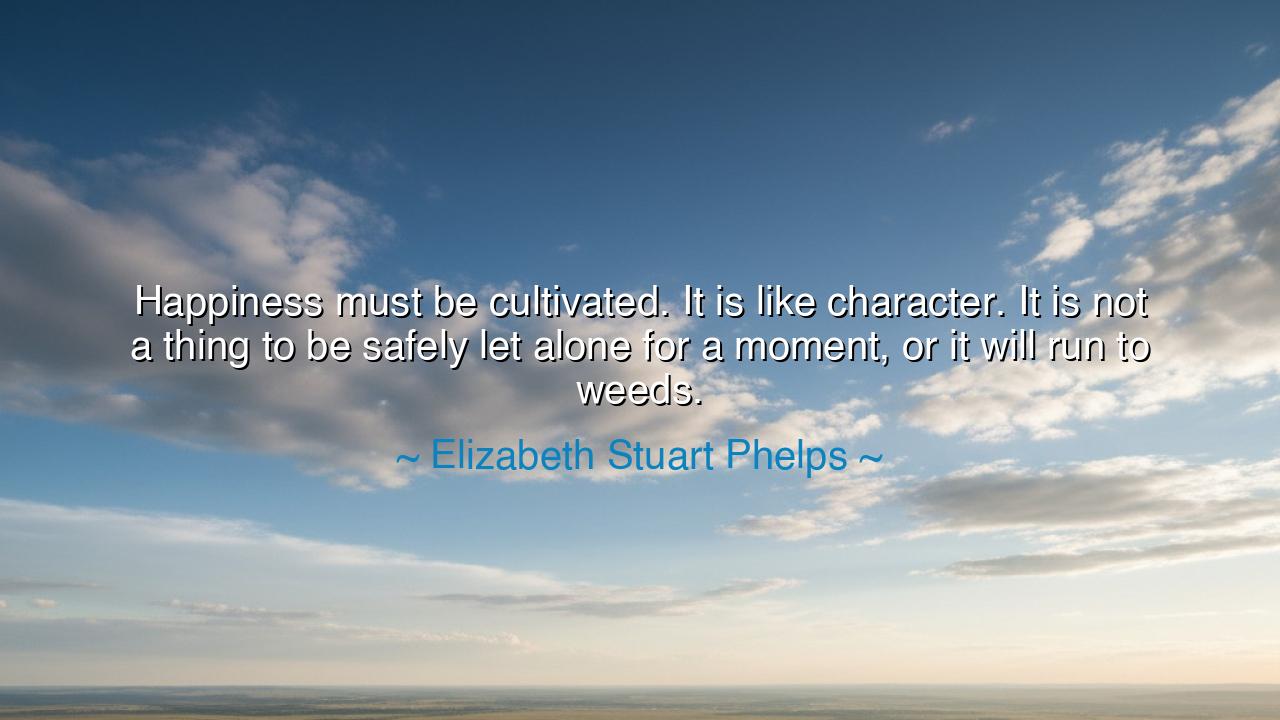
Happiness must be cultivated. It is like character. It is not a
Happiness must be cultivated. It is like character. It is not a thing to be safely let alone for a moment, or it will run to weeds.






“Happiness must be cultivated. It is like character. It is not a thing to be safely let alone for a moment, or it will run to weeds.” — so wrote Elizabeth Stuart Phelps, a woman of letters and spirit, whose words rose from the soil of the nineteenth century like a prayer of labor and truth. In her voice we hear the wisdom of one who knew both sorrow and endurance, one who understood that joy is not an inheritance, but a discipline. She reminds us that happiness, like a living garden, does not flourish by neglect. It must be tended with patience, effort, and devotion, or it will be overrun by the weeds of discontent and despair.
In these words, Phelps speaks not of fleeting pleasure, but of the deep, cultivated joy that grows only through the steady practice of the soul. The heart, like the earth, bears both fertile and barren ground. If we sow kindness, gratitude, and purpose, happiness takes root and blossoms. But if we leave the soil untended, bitterness and idleness creep in, choking what is noble within us. Her message is not gentle comfort, but command: Do not wait for happiness to come; build it, work it, protect it.
Consider the life of Helen Keller, who was struck by both blindness and deafness in infancy. By all appearances, life had denied her every reason for joy. Yet through relentless effort, guided by her teacher Anne Sullivan, she cultivated her happiness as one tends a fragile plant through winter frost. Each word she learned, each connection she forged with the world, was an act of spiritual gardening. Her joy was not given; it was grown. And when at last she spoke to the world, her words shone with the radiance of one who had wrestled light from darkness. Hers was the living proof that happiness, like character, is forged by labor, not by luck.
Elizabeth Stuart Phelps herself knew the thorns that grow around the soul. She wrote during an age when women’s voices were hushed, and yet she lifted her pen with courage. Her life was marked by grief — she lost her father, her home, and much of her early peace. But from that hardship she crafted beauty, teaching that resilience is the gardener’s spade of the heart. To her, happiness was a sacred duty, not a passing indulgence. She believed that neglecting one’s own joy was a moral failure — for without tending to the spirit, one cannot bring goodness into the world.
How often do we, in our hurried age, treat happiness as something owed to us — a fruit we expect to fall without planting the seed? We chase pleasures, but we do not cultivate peace. We expect fulfillment, yet neglect the slow work of gratitude, forgiveness, and faith. And so our hearts grow wild with envy and complaint. Phelps’s warning echoes across the centuries: leave happiness unattended, and it will decay. Like an abandoned garden, the soul left idle soon fills with weeds — self-pity, bitterness, fear — until there is no room for beauty to grow.
There is a kind of heroism in this philosophy. For it teaches that true joy belongs not to the fortunate, but to the faithful. The warrior of the spirit rises each morning to tend the inner field — pulling up weeds of resentment, watering seeds of hope, pruning branches of pride. It is hard work, unseen and unpraised, but it yields the rarest of harvests: a steady heart. The ancients knew this truth too. Aristotle taught that happiness, or eudaimonia, was not pleasure but the active practice of virtue — a life cultivated toward excellence. Phelps’s voice joins his across time, declaring that the garden of the heart is holy labor.
Lesson: Do not treat happiness as a gift to be received, but as a garden to be tended daily. Rise each day with care for your inner ground. Sow kindness toward others. Water your thoughts with gratitude. Pull up the weeds of envy and despair the moment they appear. Be vigilant, for neglect is the enemy of joy. And when storms come — as they always will — stand firm in the knowledge that what is deeply cultivated will not be easily destroyed.
For in the end, happiness and character are one and the same. Both are born of the same soil, both require the same hands, and both reward the same patience. Tend them, and they will bloom even in winter.






AAdministratorAdministrator
Welcome, honored guests. Please leave a comment, we will respond soon